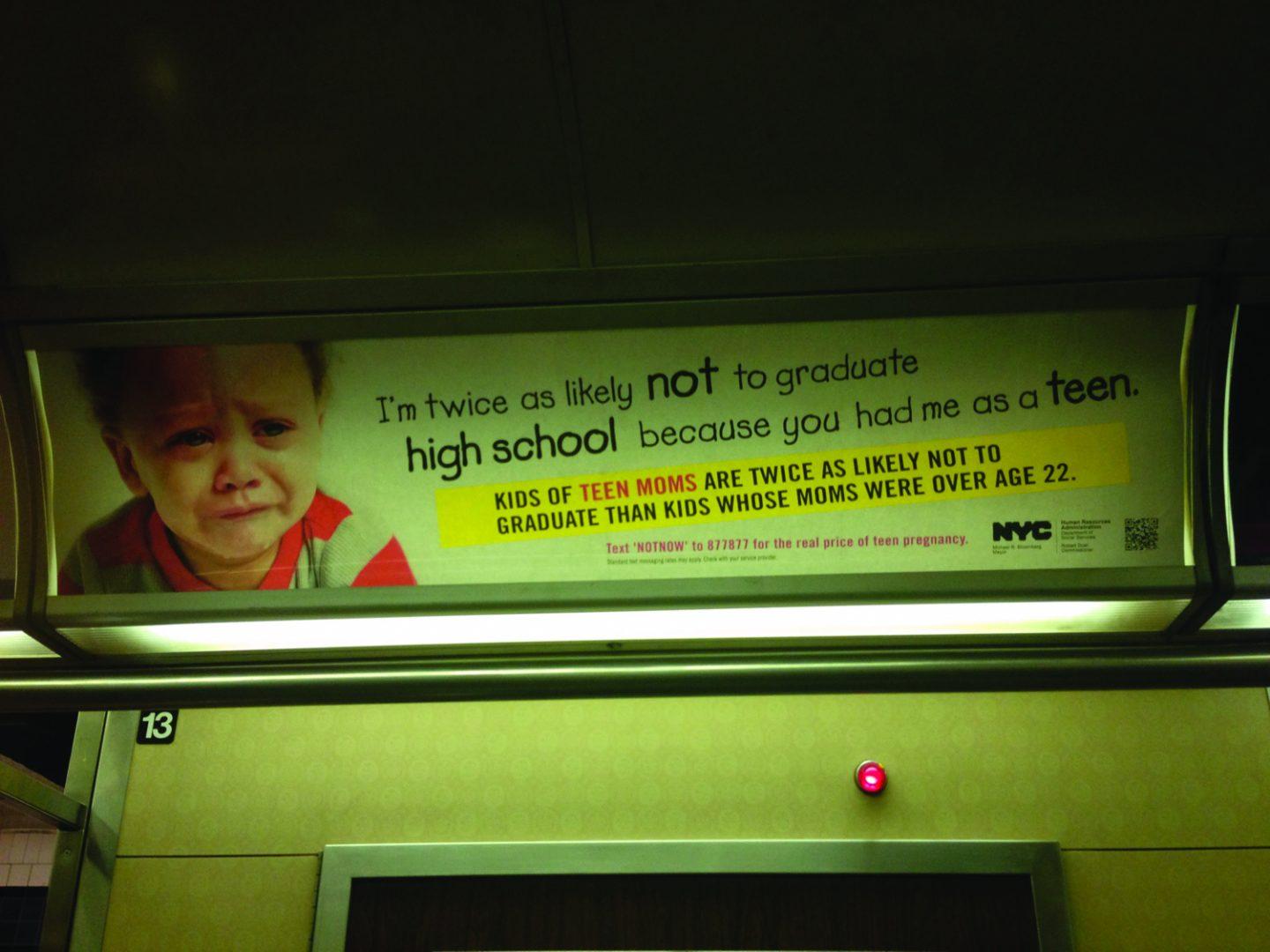NYC Ads Unfairly Shame Young Mothers
March 27, 2013

Somewhere in the bowels of New York City, the positive ideals surrounding life, birth and motherhood have been lost, only to be replaced by public apathy, ignorance and discrimination. Hopefully you’re asking yourself—if you have a moral compass, that is—“What the hell happened?!”
From average New Yorkers to high-profile political pundits to bloggers like Keli Goff, Kirsten West Savali and Gloria Malone, people have been debating the validity of New York City’s new educational ad campaign on teen pregnancy. Superficially this may seem like a liberally progressive endeavor. But unfortunately, this campaign was poignant for all the wrong reasons. Take a look at some of the taglines (all said by the children in the campaign’s photos):
“I’m twice as likely not to graduate high school because you had me as a teen.”
“Honestly Mom…chances are he won’t stay with you. What happens to me?”
“Got a good job? I cost thousands of dollars each year.”
“Dad, you’ll be paying to support me for the next 20 years.”
Where do I begin?
These ads, whose production has been justified on the basis of “preventative education” are in reality wrongfully disparaging for the demographic that they seek to help. Rather than communicating constructive messages to curb incidences of teenage pregnancy, the ads, put in place by the city’s funding, have only punished teen mothers and their children.
The Bloomberg administration has a right to be concerned about teen pregnancy, as approximately 90 percent of teen pregnancies (especially in poorer areas) are unplanned. It is also undeniable that they have made significant gains in addressing it in the past, as they have reduced teen pregnancy in New York City by 30 percent over the last decade.
However, in this campaign, the government failed to accurately represent the demographic that it was talking about. Although Hispanics have the highest incidence of teen pregnancy, they don’t seem to be portrayed at all, while 75 percent of the babies portrayed are black.
These ads portray the idea that teen moms and their children have unlikely prospects of being successful and happy in life. It shows that young mothers can never be capable of being good mothers. It tells New Yorkers that minorities are perpetrators and uneducated, wasting their time with promiscuous sex only to get knocked up before their time. It shows that children of color are burdensome, expensive annoyances. What these ads show, all in all, is hopelessness.
But if we can collectively take a moment to examine the true origins of teen pregnancy, rather than preoccupying ourselves with the insensitive statements made by the city’s ad campaign, more progress can be made within the fight to prevent these unplanned teen pregnancies.
Yes, it can be conceded that minority women have the highest rate of teenage pregnancy, but these rates are caused by institutional issues like a lack of education and high dropout rates, economic disparities and poverty within families of color and undercurrents of racial profiling. Planned Parenthood issued a statement that the poster campaign “ignored the racial, economic and social factors that contribute to teenage pregnancy,” and they were correct in saying so.
Why not focus on funding programs that help teen mothers attain higher levels education and career development? I suppose because it’s easier for governments at all levels to say “survival of the fittest” rather than enforce expensive policies that may truly improve the social welfare of demographic bottom.
People ought to recognize that any woman from a socioeconomically disadvantaged background is more likely to experience pregnancy at a young age, no matter what the color of her skin. And more importantly, she should not be stigmatized because of it—or be convinced by municipal ad campaigns that life after having a baby will be a perpetual downward spiral. Hopes, dreams and aspirations for having a better life do not disappear, even for teen moms, once babies are born.










Dave • Apr 7, 2013 at 8:22 pm
I thought the ad campaign was aimed at teens who are already pregnant? Because this doesn’t seem like a pregnancy prevention campaign as much as one that would encourage teen mothers to get an abortion. Hence the “not now” tagline.
I find it encouraging that for all the services that try and prevent teens from having abortions, at least one points out the realities of teen mothers. It’s simply not a joyful time if you don’t have the necessary financial resources.
This doesn’t mean the city shouldn’t also work on the other issues you have mentioned. However, an ad campaign like this is fairly cheap and addresses an audience where the ship for prevention has already sailed.